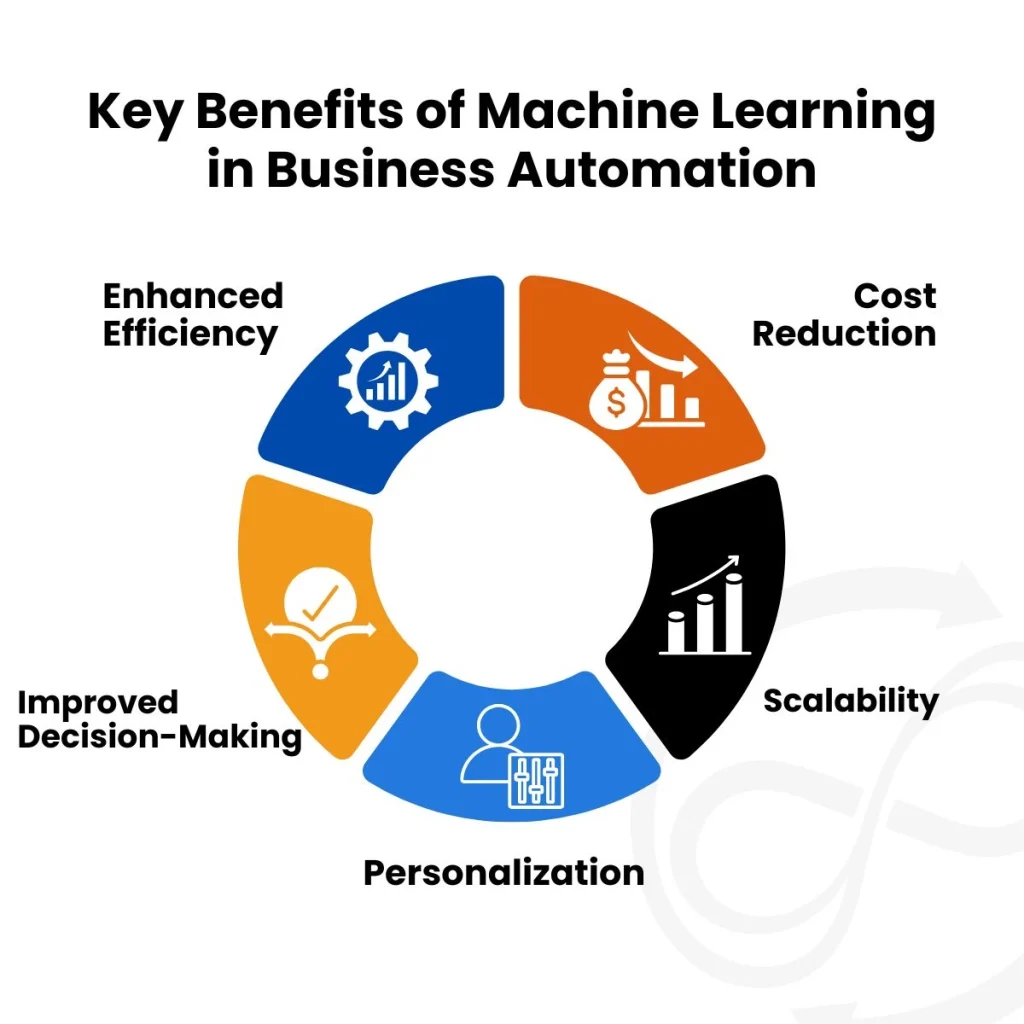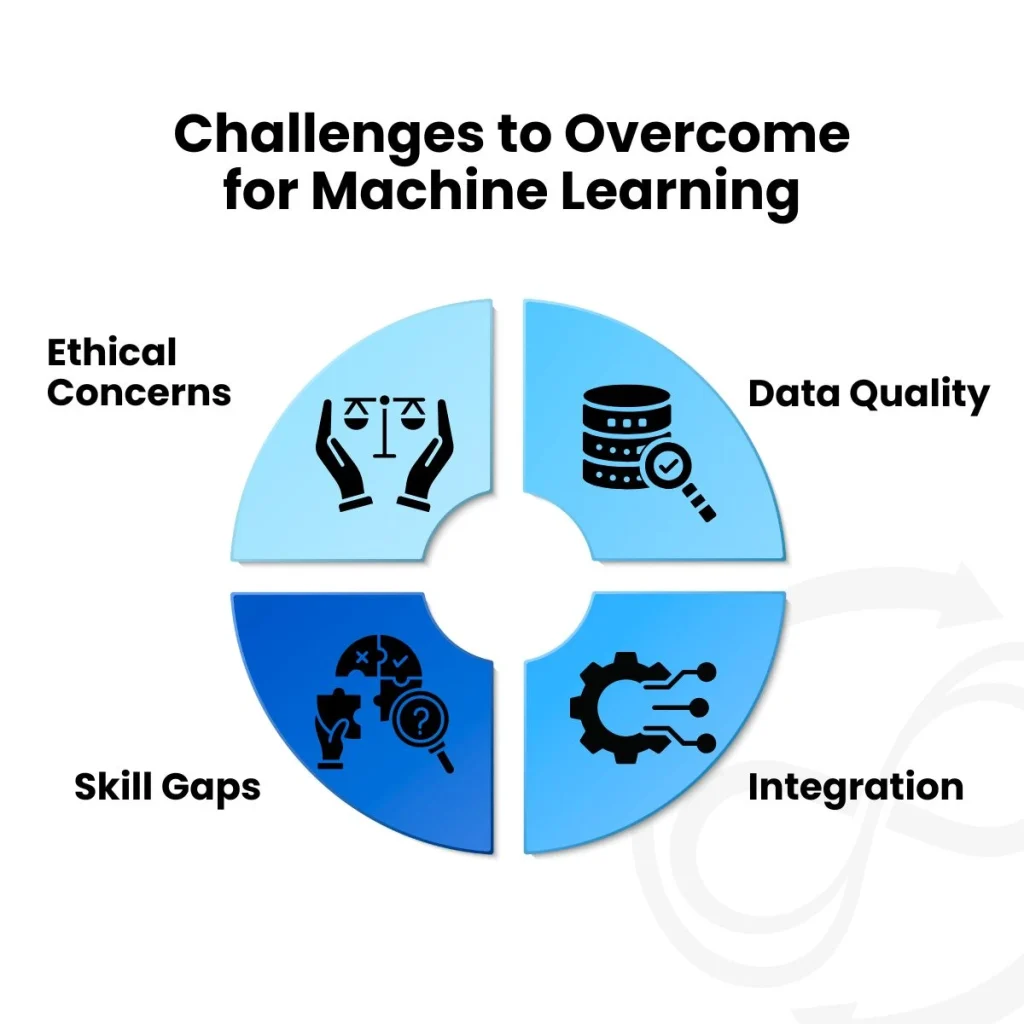The contemporary business environment is very dynamic, and to survive and thrive, one needs to be fast, flexible, and creative. Business automation through machine learning is a new invention transforming the way organizations work by providing more intelligent means of delivering efficiency through cost reduction and better decision-making processes. From simple repetitive processes to anticipating market trends, this is what machine learning means for the automation of businesses. This blog explores how machine learning is reshaping business process automation, the role of AI in business process automation, and the potential of workflow automation with machine learning to drive sustainable growth.
What is Machine Learning in Business Automation?
Artificial intelligence, specifically machine learning, allows computers to learn from data and modify their processes to improve performance on a given task. In the context of business automation, ML allows organizations to autonomously manage complex
processes, as well as analyze diverse data and make decisions without human intervention. While traditional automation is based on a set of rules, the integration of machine learning in business automation has the flexibility to adapt its strategies according to contextual conditions, which is why such types of automation fit well in industries such as finance, healthcare, retail, etc.
For example, when using data, it can be found that ML algorithms can make marketing campaigns more specific to customers or make supply chain operations more efficient. By using AI in business process automation, what organizations are now getting is not a rigid line of work but rather a system that is agile to the needs of the organization.
The future of machine learning in this space lies in its ability to make automation not
just faster but smarter.
The Role of Business Process Automation
Business Process Automation (BPA) defines the use of technology to streamline various processes of an organization, for example, data entry, invoice processing, as well as customer support. Typically, BPA is used to enforce rules and address existing
problems there, which were unable to handle unstructured data and other unpredictable situations. The use of machine learning here increases the possibilities of business process automation, as it can deal with ambiguity.
For example, in accounts payable, workflow automation with machine learning can extract data from invoices regardless of format, reducing manual effort and errors. ML-powered chatbots. Another example is ML-powered chatbots that are used to deal with customer inquiries through the use of natural language processing to increase overall response times and customer satisfaction. The future of machine learning towards the automation of business tasks suggests cases where systems will perform these tasks independently.
Read More: How Automation Enhances Efficiency and Security
Key Benefits of Machine Learning in Business Automation

The integration of machine learning into business automation offers several advantages:
- Enhanced Efficiency: It helps automate tasks using a workflow of machine learning and increases efficiency by strengthening speed. For example, ML can organize tasks in project management tools based on their level of importance and the resources required to execute them.
- Cost Reduction: It has been established that one of the potential positive effects of automating most tasks is the reduction of labor costs as well as the elimination of errors. The use of AI in business process automation can save businesses millions of dollars annually.
- Scalability: As businesses expand, the capabilities of ML systems grow to handle new complexity, and thus, business process automation remains scalable and sustainable.
- Personalization: In the marketing arena, machine learning adapts to customer behavior and makes them more engaged and loyal to products. These benefits highlight why the future of machine learning is central to modern business automation strategies.
- Improved Decision-Making: ML can work with historical data and real-time data to come up with the necessary recommendations. For example, retailers use machine learning in business automation to strive for field demands as well as stock management.
What are The Emerging Trends in the Future of Machine Learning?
The future of machine learning in business automation is shaped by several exciting trends:
- Hyper-Automation
Hyper-automation uses machine learning, along with robotic process automation and other artificial intelligence technologies, to automate specific processes in an enterprise. For example, in the manufacturing industry, AI-assisted business process automation can manage production lines, create work schedules, and predict equipment failures. This trend will redefine workflow automation with machine learning, enabling seamless integration across departments.
- Explainable AI
It is very important to ensure that there is an aspect of transparency when adopting machine learning in business automation. It enables models to justify their actions or decision-making to gain credibility for automated systems. This is especially applicable in areas like finance, where business process automation needs to meet all the requirements.
- Low-Code and No-Code Platforms
The future of machine learning development will be democratized by implementing no-code and low-code platforms. These tools allow non-technical users to implement workflow automation with machine learning, enabling small businesses to compete with larger enterprises. Businesses can automate their inventory management with no-code platforms, even though they would typically need to employ data scientists to complete this task.
- Predictive and Prescriptive Analytics
Machine learning is moving beyond predictive analytics (forecasting outcomes) to prescriptive analytics (recommending actions). In business automation, this means ML systems can not only predict customer churn but also suggest retention strategies. This capability will redefine AI in business process automation by making systems proactive rather than reactive.
- Edge AI
Edge AI is a part of the process in which machine learning occurs on edge devices, such as IoT sensors, and does not require the cloud. Edge AI can perform real-time optimization of such deliveries, which increases the efficiency of business processes in time-sensitive situations in the field of logistics. The future of machine learning will see edge AI play a bigger role in decentralized workflow automation.
Read More: What Is the Future of Machine Learning?
Challenges to Overcome

While the future of machine learning in business automation is bright, challenges remain:
● Data Quality: Effective ML systems rely on high-quality data relevant to their tasks. Poor-quality data will introduce errors into automated system actions.
● Integration: Integrating machine learning into existing systems requires significant work and costs money on business automation.
● Skill Gaps: Companies need expert staff for AI in business process improvements, and they may lack these staff in certain areas.
● Ethical Concerns: When ML models show bias, people lose trust in automated workflows that use machine learning. Businesses should focus on a fair and open approach.
Addressing these challenges will be crucial to unlocking the full potential of machine
learning in business automation.
Wrapping Up
The future of machine learning in business automation is not just about efficiency—it’s about reimagining how businesses operate. Technological advancements in the use of machines in business transactions will lead to better business process automation, more efficient business processes through the use of machine learning, and additional business opportunities in automation. There is no doubt that with problems such as data quality and ethical issues, AI presents more opportunities to address difficulties. When it comes to business automation, there is no limit to the number of trends emerging, such as hyper automation and edge AI.
Ready to embrace the future of machine learning?
Start exploring how machine learning in business automation can elevate your operations today.
Share your thoughts or experiences with business automation in the comments below!
What is machine learning in business automation?
Machine learning in business automation uses AI to automate processes and
improve decision-making. This gives systems the ability to understand the meaning of
data and improve them according to business needs.
How does machine learning enhance business process automation?
Machine learning enhances business process automation because it deals with big, unstructured data. This means it is more effective and intelligent across disciplines than traditional rule-based processes.
What are the benefits of workflow automation with machine learning?
Workflow automation with machine learning boosts efficiency, reduces costs, and enhances scalability. It also enables personalized customer experiences and better decision-making.
What industries benefit from AI in business process automation?
AI in business process automation includes the finance industry, healthcare centers,
the retail sector, and the manufacturing industry. It helps reduce the time associated with
processes like fraud detection, patient care, and inventory management.
What challenges does the future of machine learning in business automation face?
The main challenges currently facing the future of machine learning include data quality issues and data integration. Skills and ethical issues raise concerns that must be addressed for the successful implementation of talent management.

